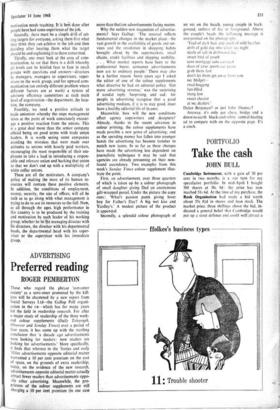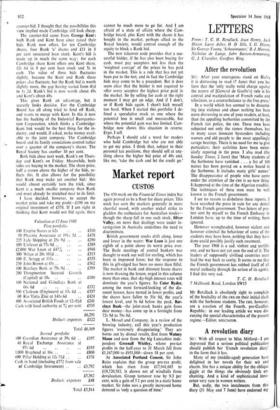Take the cash
PORTFOLIO JOHN BULL
Cambridge Instrument, with a gain of 30 per cent in two months, is a star ,turn for my speculative portfolio. In mid-April I bought 300 shares at 38s 9d : the price has now reached 51s 6d. At the time of my purchase, the Rank Organisation had made a bid worth about 35s 8fd in shares and loan stock. The market price, three shillings above the bid, in- dicated a general belief that Cambridge would put up a stout defence and could well attract a counter-bid. I thought that the possibilities this view implied made Cambridge still look cheap.
The counter-bid came from George Kent : both Rank and Kent have since raised their bids. Rank now offers, for ten Cambridge shares, four Rank 'A' shares and ft 1 in 8 per cent unsecured loan stock. Kent's bid is made up in much the same way: for each Cambridge share Kent offers one Kent share, 12s 6d in 8 per cent loan stock and 5s in cash. The value of these bids fluctuates slightly, because the Kent and Rank share prices also fluctuate, but the Rank bid is worth slightly more, the gap having varied from 4fd to Is 2d. Rank's bid is now worth about 49s and Kent's about 48s.
This gives Rank an advantage, but it scarcely looks decisive. For the Cambridge Board has all along tried to fend off Rank, and wants to merge with Kent. In this it now has the backing of the Industrial Reorganisa- tion Corporation, which thinks a Cambridge- Kent link would be the best thing for the in- dustry, and would, if asked, make money avail- able to the joint company. The Cambridge board and its family associations control rather over a quarter of the company's shares. The Royal Society has another 10 per cent.
Both bids close next week, Rank's on Thurs- day and Kent's on Friday. Meanwhile, both sides are buying in the market. The share price, half a crown above the higher of the bids, re- flects this. It also allows for the possibility that Rank may make yet another bid: this would almost certainly turn the trick, since Kent is a much smaller company than Rank and must already be stretched near to its limit.
I have decided, however, to accept the market price and take my profit—£198 on my original investment of £574. If I am right in thinking that Kent would not bid again, there Valuation at 12 June 1968 First portfolio 100 Empire Stores at 62s .. £310 50 Phoenix Assurance at 191s 3d .. £478 225 Lyle Shipping at 25s 9d .. £290 100 Unilever at 77s 9d .. • • £389 £2,000 War Loan at £47156 £946 300 Witan at 20s 101d £313 100 E. Scragg at Ills .. • • £555 250 John Brown at 45s £562 100 Barclays Bank at 79s 9d £399 200 Throgmorton Secured Growth (Capital) at 18s £180 100 National and Grindlays Bank at 66s 6d £332 500 Clarkson (Engineers) at 13s 6d .. £337 60 Rio Tinto Zinc at 141s 6d £424 400 Associated British Foods at 12s Old £241 Cash with local authority at Ti per cent £535 £6,291 Deduct: expenses £122 Total £6,169 Second portfolio 100 Guardian Assurance at 39s 6d .. £197 40 Royal Exchange Assurance at 97s 6d .. • • £195 1,000 Brayhead at 16s £800 600 Pillar Holding at I2s 74d £378 Cash in hand (including £772 from sale of Cambridge Instrument) .. £3,792 £5,362 Deduct: expenses £48 Total £5,314 cannot be much more to go for. And I am afraid of a state of affairs where the Cam- bridge board, plus Kent with the shares it has bought in the market, perhaps allied to the Royal Society, would control enough of the equity to block a Rank bid.
The new takeover code provides that a suc- cessful bidder, if he has also been buying for cash, must pay acceptors not less than the 'weighted average' of the prices he has paid in the market. This is a rule that has not yet been put to the test, and in fact the Cambridge bids may come to be a precedent. But it does seem clear that the bidder is not required to offer every acceptor the highest price paid in the market. So by selling for cash at the right moment I may get an edge. And if I don't, or if Rank bids again, I shan't kick myself too hard. When I started this portfolio I de- fined a speculative stock as one where the potential loss is small and measurable, but where the potential gain was less limited. Cam- bridge now shows this situation in reverse. Ergo, I sell.
Perhaps I should add a word for readers who hold Cambridge but who are not able to get my price. I think that, subject to their personal tax positions, they should sell at any- thing above the higher bid price of 49s and, like me, 'take the cash and let the credit go.'











































 Previous page
Previous page